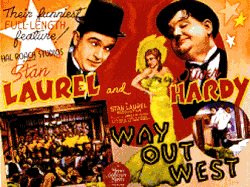Plot
Laurel and Hardy embark on a quest to locate Mary Roberts, the rightful heir to a substantial inheritance, including a gold mine deed, following news of her father's demise. Discovering Mary amidst the West's cabaret milieu, they encounter formidable obstacles in the form of her legal guardians, indifferent to her well-being and intent on usurping her wealth.
Their journey to Brushwood Gulch is beset with misfortune, from Ollie's mishap in a river sinkhole to their encounter with the stern sheriff and his wife. At Mickey Finn's saloon, a case of mistaken identity leads to the theft of Mary's deed by the unscrupulous Finns, triggering a frantic pursuit.
In a daring nighttime endeavor, Laurel and Hardy orchestrate a break-in to retrieve the deed, facing numerous obstacles. Their efforts culminate in a showdown with the Finns, wherein Ollie's improvised coercion secures the deed's return. With Mary in tow, they escape, leaving the Finns confined to their own establishment.
Soundtrack
The film's score was composed by Marvin Hatley and nominated for an Academy Award for Best Music (Scoring). The film includes two well-known songs: firstly Macdonald and Carroll's "Trail of the Lonesome Pine", sung by Laurel and Hardy (except for a few lines by Chill Wills and Rosina Lawrence, lip-synched for comedic effect by Laurel), and secondly J. Leubrie Hill's "At the Ball, That's All", sung by the Avalon Boys and accompanied by Laurel and Hardy performing an extended dance routine, one that they rehearsed endlessly.
"Trail of the Lonesome Pine" was released as a single in Britain in 1975, backed by "Honolulu Baby" from Sons of the Desert ; it reached number 2 in the British charts.
This page is based on this
Wikipedia article Text is available under the
CC BY-SA 4.0 license; additional terms may apply.
Images, videos and audio are available under their respective licenses.
